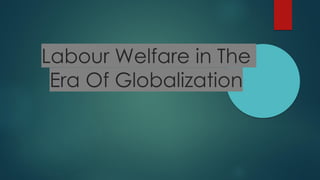
Labour Welfare in the era of Globalization.pdf
- 1. Labour Welfare in The Era Of Globalization
- 2. LABOUR LAW :INTRODUCTION ▪ Labour laws is the body of laws ,administrative rulings ,precedents which addresses the relationship between and among the employers ,employees, and labour organizations often dealing with the issues of Public law. ▪ Labour laws prospects workers from exploitation by the employers . ▪ Besides this Labour laws also provides compensation to workers under any mishap or accident during work. ▪ It fixes rest and working hours as well as gives a job security for the Labours . ▪ It minimizes labour unrest, reduce conflicts and strikes. ▪ This law relating to labour and employment in India is also termed as Industrial Laws of India. ▪ Some main objective of labour laws are : Fair wages; Equal opportunities; protecting the disabled ,Protecting children etc.
- 3. GLOBALISATION ❑ Globalisation, is the process of interaction and integration among people, companies, and governments worldwide. ❑ Globalization has accelerated since the 18th century due to advances in transportation ,communication technology and modernizing world with new techniques. ❑ The term ‘Globalization’ in law refers to the degree to which the whole world lives under a single set of legal rules. Such a single set of rules might be imposed by an international body, adopted by global consensus, or arrived at by parallel development in all parts of the globe. ❑ Globalization, and the need to attract foreign investment, inevitably leads to an attack on a workers’ rights by diluting existing labour standards, as trans-national corporations (such as the World Bank, the World Trade Organization, and the International Monetary Fund) concede to the demands of multinationals
- 4. Labour Welfare ➢ Labour Laws during Globlisation in India have been enacted keeping in view the need for economic and industrial development of a country. ➢ Labour welfare activities and benefits are not restricted to worker and workplace but they are also extended to workers’ families. Labour welfare may be considered as “efforts to make life worth living for workmen” ➢ Citing to the International Labour Organization we can say that, the concept of labour welfare is dynamic and also relative. ➢ The Indian Factories Act, 1881 prohibited exploitation of child labour up to some extent. Further The Indian Factories Act, 1911, 1934, 1948 and subsequent amendments include the provisions to protect health, welfare and safety of the workers. ➢ Besides these legislative attempts on the part of government, the mandatory labour welfare measures were moderately taken care of in the organized sector.
- 5. Post Independence the Republic of India focused more on the welfare of the labours. Some prominent acts introduced during 1950’s to 1970’s are: ❖ Mines Act, 1952 ❖ The Employees’ Provident Fund Act, 1952 ❖ The Plantation Labour Act, 1951 ❖ The Bombay Housing Board Act, 1948 ❖ Assam Tea Plantations Employees’ Welfare Fund Act, 1959 ❖ Maternity Benefit Act, 1961, Apprentice Act, 1961 ❖ The Payment of Bonus Act, 1965 ❖ The Contract Labour ( Regulation and Abolition)Act, 1970 ❖ The Payment of Gratuity Act, 1972, ❖ The Employees’ Family Pension Scheme, 1971 ❖ The Employees’ State Insurance Act, 1948 ❖ The Beedi and Sigaar Workers’ (conditions of employment) Act, 1966 ❖ The Child Labour ( Prohibition and Regulation) Act, 1986 ❖ Merchant Shipping Act, 1958 ❖ Motor Transport Workers Act,1961
- 6. ❖ As per the 1991 census about 27 million workers are in the organized sector and 259 million are in the unorganized sector. ❖ Conditions of work of contract labour in unorganized sector is still worse because of casual nature of employment, ill-literacy, scattered nature of establishment etc. ❖ Though the Contract Labour (Regulation and Abolition, Act 1970 has made some improvement ❖ Recently in India, various non-governmental organizations, women’s Self Help Groups are instrumental in initiating labour welfare activities even in unorganized sectors. ❖ In order to ensure to workers in the unorganized sector, inter-alia, includes weavers, handloom workers, fisher men and fisher women, toddy tappers, leather workers, plantation workers, beedi workers. The Unorganized Workers’ Social Security Act, 2008’ has been enacted. ❖ Further Supreme Court of India has also played a key role in protecting and promoting the basic human rights of the unorganized workers. WELFARE For Unorganized Sectors
- 7. CONCLUSION Although Globalisation has played a very important role in shaping the Labour laws and the welfare of the Labour laws for the easy survival of workers and labours with benefits of them as well as the employers. Beside this improvements need to be done for true welfare of the labours with globalization. Some important suggestions such as : • Employers should take cautious and conscious efforts to avoid any strike, strife in the industries • Employers and trade unions should take proactive steps by suitably using the information technology based equipment and services for prevention of industrial hazards. • Efforts should be taken to provide housing facility to the workers near the work place so as to avoid unnecessary transport and save the time by formulating appropriate programs with the help of government and Trade Unions or else providing housing loans to purchase houses elsewhere may be considered to create healthy environment for the workers and their families to achieve the goal of industrial harmony and peace by respecting basic human values and human rights of the individuals in the emerging changes in industrial sector.